
0791_ABSMC_PGR: The Psychology of Evil: Clinical Insights into Political Destruction (Part 1)_Live
Description:
This session will examine the philosophical and psychological frameworks that underlie destructive leadership and collective harm, with a focus on how these dynamics manifest in clinical and societal contexts. Participants will learn to differentiate between types of perpetrators, recognize clinical red flags such as moral disengagement and grievance fused with grandiosity, and explore pathways for psychological and social repair. Drawing on evidence-based research and case studies, the session aims to equip healthcare professionals with practical tools to identify, understand, and address the mechanisms of harm in both individual therapy and community interventions.
Assembly Bills 1195 & 241- Culturally Appropriate Care which is Free of Implicit Biases:
Learners are strongly encouraged to engage in self-directed learning related to the impact of implicit biases in this clinical area via the references provided below:
SDoH/CLC:
Social Determinants of Health (SDOH)/Cultural or Linguistic Considerations:
Alexopoulos, George S. "The evolution of western philosophical concepts on social determinants of mental and medical health." International Psychogeriatrics 36.1 (2024): 1-8.
Implicit Bias Considerations (as it relates to the content):
Gómez Lanz, Javier, et al. "Business Professionals and White-Collar Offenders: A Comparative Analysis and Offender Subtypes." Deviant Behavior (2025): 1-19
Target Audience
Nurse Practitioner (NP)
Nurse, Registered (RN)
Physicians (MD or DO)
Physician Assistant (PA)
Psychologists
Social Workers
Other Healthcare Professionals
Students of Health Professions
Learning Objectives
After attending this activity, learners will be able to:
1. Discuss philosophical and psychological frameworks (from Plato’s idea of ignorance as evil to modern theories of moral disengagement and malignant narcissism) to better understand how destructive leadership takes root in
2. Differentiate between types of perpetrators—architects, bureaucrats, followers and implementers—and recognize how their psychological structures diverge in motivation and mechanisms of harm.
3. Examine the psychological functions of ideology and myth-making in sustaining destructive leaders and their regimes (e.g., “Hitler Myth,” Stalin’s paranoia, Mao’s permanent revolution).
Disclosure of Financial or In-Kind Commercial Support & Conflict of Interest
No one involved in the planning or presentation of this educational activity have any relevant financial relationship(s) to disclose with ineligible companies whose primary business is producing, marketing, selling, re-selling, or distributing healthcare products used by or on patients. No financial or in-kind commercial support was received to produce or promote this educational activity.
– Provider Designee/Verification: Fozia Ferozali, Ed.D
Jurgen Braungardt, Ph.D., MFT
Melinda Ginne, Dr. Melinda Ginne
David Green, LCSW, MSW, PPSC
Jonothon Gross, Jonothon Gross, M.D.
Jeremy Hurley
Karl Knobler
Fran Krieger-Lowitz, Ph.D., CGP, M.Ed.
Luana Shiba-Harris
Stephen Sturges, Stephen Sturges, MD
Jurgen Braungardt, Ph.D., MFT
Melinda Ginne, Dr. Melinda Ginne
David Green, LCSW, MSW, PPSC
Jonothon Gross, Jonothon Gross, M.D.
Jeremy Hurley
Karl Knobler
Fran Krieger-Lowitz, Ph.D., CGP, M.Ed.
Sandra Lyn, MSP, MSN/Ed, PMH-BC. RN
Luana Shiba-Harris
Stephen Sturges, Stephen Sturges, MD
Jurgen Braungardt, Ph.D., MFT

In support of improving patient care, Sutter Health, is jointly accredited by the Accreditation Council for Continuing Medical Education (ACCME), the Accreditation Council for Pharmacy Education (ACPE), the American Nurses Credentialing Center (ANCC), and the Association of Social Work Boards (ASWB) to provide continuing education for the healthcare team.
Credit Designation Statement
Sutter Health designates this LIVE activity for a maximum of 1.50 AMA PRA Category 1 Credits™ for physicians, 1.50 continuing professional development contact hours for nurses and 1.50 general continuing education credits for social workers. Learners should claim only the credit commensurate with the extent of their participation in the activity.
Note to Other Disciplines: Non-Physician Participation Credit Continuing Medical Education is acceptable for meeting the continuing education requirements for Pharmacists, Physician Assistants, Psychologists, Registered Nurses, and Respiratory Care Practitioners. For other disciplines, please check with the regulatory board for your discipline to confirm what type of credits meet the continuing education requirements. Continuing education hours for nurses accredited by ANCC, via Joint Accreditation.
Attendance & Credit Claiming
Text the 6-letter attendance verification code to (916) 866-7913 to claim credit.
Available Credit
- 1.50 AMA PRA Category 1 Credit™
Physician Credit
Sutter Health designates this Live activity for a maximum of 1.50 AMA PRA Category 1 Credit™ for physicians. Physicians should claim only the credit commensurate with the extent of their participation in the activity.
- 1.50 Non-Physician Participation Credit
Sutter Health designates this Live activity for a maximum of 1.50 Non-Physician Participation Credit. Non-Physicians should claim only the credit commensurate with the extent of their participation in the activity.
AMA PRA Category 1 Credits HOURS™ Continuing Medical Education is acceptable for meeting the continuing education requirements for Pharmacists, Physician Assistants, Psychologists, Registered Nurses, and Respiratory Care Practitioners. For other disciplines, please check with the regulatory board for your discipline to confirm what type of credits meet the continuing education requirements. Continuing education hours for nurses accredited by ANCC, via Joint Accreditation.
- 1.50 ANCC
Nursing Credit - American Nurses Credentialing Center (ANCC)
Sutter Health designates this Live activity for a maximum of 1.50 ANCC contact hour(s). Nurses should claim only the credit commensurate with the extent of their participation in the activity.
- 1.50 ASWB-ACE
Social Work Credit
As a Jointly Accredited Organization, Sutter Health is approved to offer social work continuing education by the Association of Social Work Boards (ASWB) Approved Continuing Education (ACE) program. Organizations, not individual courses, are approved under this program. Regulatory boards are the final authority on courses accepted for continuing education credit. Social workers completing this course receive 1.50 continuing education credits.
- 1.50 CA BRN
Nursing Credit - California Board of Registered Nursing (CA BRN)
This activity is approved for 1.50 contact hour(s) by Sutter Health, which is an approved provider by the California Board of Registered Nursing. (Provider Number 17182). Nurses should claim only the credit commensurate with the extent of their participation in the activity. - 1.50 IPCE
This activity was planned by and for the healthcare team, and learners will receive 1.50 Interprofessional Continuing Education (IPCE) credit for learning and change.

 Facebook
Facebook X
X LinkedIn
LinkedIn Forward
Forward